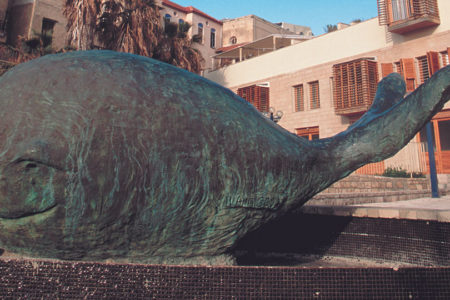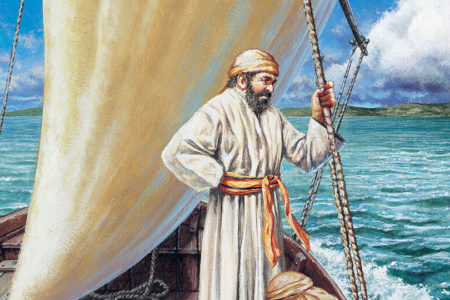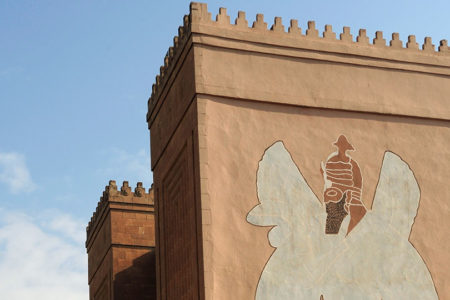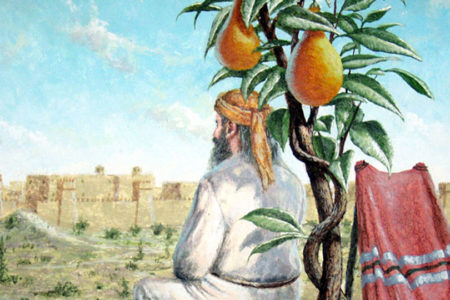God’s Judgment Against Judah
Micah 6:1-16
In chapter six of Micah, God brings litigation against the people of Judah, charging them with gross immorality and idolatry. Judah is the defendant, and the Lord is both the prosecuting attorney and judge.
Prosecution Revealed
As the proceedings open, Micah states the Lord’s position:
Hear now what the LORD saith: Arise, contend [literally, “plead your case”] before the mountains, and let the hills hear thy voice. Hear ye, O mountains, the LORD’S controversy, and ye strong foundations of the earth; for the LORD hath a controversy [lawsuit] with his people, and he will contend [plead] with Israel (vv. 1–2).
Judah is asked to testify of any evil the Lord has committed against her. The mountains, hills, and foundations of the earth represent immutable and inanimate creation, which have, since time immemorial, stood in silent witness to God’s gracious faithfulness toward evil Judah. They are asked to listen to God’s lawsuit as He pleads with Judah concerning her sin and idolatry.
God asks Judah two rhetorical questions, requesting that the nation present any charge it has against Him: “O my people, what have I done unto thee? And in what have I wearied thee? Testify against me” (v. 3).
Judah is addressed as “my people,” revealing God’s strong covenant love, deep affection, and care for the nation. Like a father before his wayward son, God examined His own heart to see if He put unreasonable demands on Judah or neglected her, causing her unfaithfulness. In what way had He wearied Judah? Had He made harsh demands on her that were too difficult for her to keep? Had He not provided enough help during her pilgrimage as a nation? Had He failed her during times of crises and conflicts?
Since Judah presented no countercharges, God answered His own rhetorical questions:
For I brought thee up out of the land of Egypt, and redeemed thee out of the house of servants; and I sent before thee Moses, Aaron, and Miriam. O my people, remember now what Balak, king of Moab, devised, and what Balaam, the son of Beor, answered him from Shittim unto Gilgal, that ye may know the righteousness of the LORD (vv. 4-5).
In short, God (1) liberated the Israelites from Pharaoh; (2) redeemed them from slavery in Egypt; (3) gave them Moses, Aaron, and Miriam as political and religious leaders to guide them; (4) delivered them from Balak’s evil plan to curse them (Num. 22—24); and (5) took away their shame, providing forgiving grace at Shittim (Num. 25; Josh. 3:1).
It was at Gilgal, where Israel camped after entering the Promised Land (Josh. 4:19), that God renewed His covenant. There, through circumcision—the sign of being under the Abrahamic Covenant—God renewed His covenant promises and blessings with Israel (Josh. 5:2–11) and gave the nation strength to defeat her enemies. All these acts of grace and mercy were bestowed on Israel so that she “may know the righteousness of the LORD.”
Judah, to whom God addressed His rhetorical questions and illustrations, knew it had no grounds for criticism or countercharges against the Lord’s dealings with the nation. Judah’s unfaithfulness was not because of anything God did or did not do but was totally of her own making.
Purity Required
Israel responded to God’s indictment by asking rhetorical, hypothetical questions. Micah presented Israel’s questions in the first person singular, requesting that God give evidence of what He required of individual Israelites. Some scholars believe these questions are querulous in tone, revealing Israel’s deplorable ignorance. If not, they at least betray the nation’s bankrupt spiritual condition. Other scholars believe these questions counter God’s indictment of Israel and show Israel’s willingness to give all to be restored to Him.
The Israelite asked, “With what shall I come before the LORD, and bow myself before the High God? Shall I come before him with burnt offerings, with calves of a year old?” (v. 6). He was asking what sacrifice God required him to bring in worship, so he could please God. If God would reveal His demands, the Israelite was ready in his devotion to present the type of sacrifice that would satisfy the Lord. The burnt offering, unlike other offerings, required that the whole animal be presented as a sacrifice. A one-year-old calf was more valuable than a younger calf because time and expense had been invested in the animal.
Next, the Israelite asked how many sacrifices God required to please Him: “Will the LORD be pleased with thousands of rams, or with ten thousands of rivers of oil?” (v. 7). Thousands of rams, great in value, were the offerings of a king like Solomon. God never required such a sacrifice from an individual. Or would God be pleased with a libation of ten thousand rivers of oil? Oil was presented in small amounts when the daily meal offering and other sacrifices were presented.
Israel’s questions reach a crescendo with an absurd and unthinkable question: “Shall I give my first-born for my transgression, the fruit of my body for the sin of my soul?” (v. 7). Such questions revealed how clueless the Israelite was concerning what pleased God. For God had, through the Mosaic Law, condemned human sacrifice (Lev. 18:21).
Then Micah answered the questions:
He hath shown thee [told you], O man, what is good; and what doth the LORD require of thee, but to do justly, and to love mercy, and to walk humbly with thy God? (v. 8).
The Israelite should have known what God demanded of him, for it was revealed in the Mosaic Law (Dt. 6:5; 10:12). God demanded obedience rather than sacrifice (1 Sam. 15:22; Hos. 6:6) and wanted His people to walk in justice and trust Him (1 Sam. 12:14; Hos. 12:6). Even today, the Lord is more concerned with an individual’s character and conduct than with sacrifice.
Once again Micah summarized what God demanded of His people. His statement is a model of the Israelites’ duty toward man and God. First, “to do justly” means to maintain honest and just relationships with one another as revealed in the Mosaic Law (Ex. 20—23; Mic. 2:1–2, 8–9; 3:1–2, 9–11). Second, “to love mercy” (Hebrew, hesed) expresses an attitude of loyal, covenant obedience. In divine love, God made a voluntary covenant with Israel in which He promised to be obedient to the provisions made in covenant partnership with the nation. Likewise, the Israelites were voluntarily to manifest the same attitude of loyal love and obedience to God and their fellowman. Third, “to walk humbly with thy God” means they were to live circumspectly and wisely in following God’s will. Micah warned the Israelites not to be careless by doing things their own way, but to do all things carefully, according to God’s will. If they lived according to God’s Word, they also would treat their fellowman with justice and love.
God’s requirements for Israel were not negative, but positive. If followed, the Israelites would have enjoyed full lives that pleased God. God required much more from them than bringing animal sacrifices in worship. The Lord required total commitment from the heart, as revealed in His Word.
Prosperity Repudiated
After presenting Judah with God’s standards, Micah exposed the corruption of Jerusalem. The prophet denounced Judah’s disloyalty and dishonesty: “The LORD’S voice crieth unto the city [Jerusalem], and the man of wisdom shall see thy name; hear ye the rod, and who hath appointed it” (v. 9). Micah advised the people to listen closely and heed what God had to say. For God had appointed a “rod” (a nation used as an instrument of His wrath) to bring judgment on Judah.
Judgment will come on the nation for three reasons. First, merchants had dishonestly and deceitfully acquired and accumulated wealth: “The treasures of wickedness [are] in the house of the wicked” (v. 10). Second, merchants had used irregular weights in doing business: “the scant measure that is abominable, . . . the wicked balances, . . . the bag of deceitful weights” (vv. 10–11). Third, the inhabitants were wicked: “For the rich men are full of violence [lawlessness], and the inhabitants have spoken lies, and their tongue is deceitful in their mouth” (v. 12). Injustice, insult, and a lack of integrity permeated Judean society. The wealthy set society’s pattern in deceiving and defrauding the people.
Punishment Rendered
Judah’s sins brought God’s judgment. The punishments Micah was about to mention had already started to be felt. First, sickness came on the people as a result of sin: “I make thee sick” [literally, “have made”] . . . [and] desolate because of thy sins” (v. 13). In Deuteronomy 28, Moses listed all the afflictions and destruction Israel would experience if she turned from serving God.
Second, they will go hungry: “Thou shalt eat, but not be satisfied; and thy casting down shall be in the midst of thee” (v. 14; cf. Lev. 26:26).
Third, their storehouse of food will be rifled by enemies: “And thou shalt take hold, but shalt not deliver” (v. 14; cf. Lev. 26:16–17; Dt. 28:33).
Fourth, they will sow crops but will not reap a harvest because they will be taken captive and not allowed to eat the fruit of their labor: “Thou shalt sow, but thou shalt not reap; . . . tread the olives, but . . . not anoint thyself with oil; and sweet wine, but . . . not drink wine” (v. 15; cf. Dt. 28:39–40).
Fifth, their sin is repudiated because they followed the sinful practices of Omri and Ahab, the two most evil kings in Israel:
For the statutes of Omri are kept, and all the works of the house of Ahab, and ye walk in their counsels; that I should make thee a desolation, and your inhabitants an hissing; therefore, ye shall bear the reproach of my people (v. 16).
Under these two kings, Baal worship flooded the land of Israel (1 Ki. 16:21—22:40). Even Judah followed Ahab’s wicked counsel. As a result, Judah will be made desolate; and its people will be hissed at, that is, held in derision or ridiculed by the world (cf. Lam. 2:15–16). They will suffer reproach, or be disgraced and despised during their captivity.
Like Judah, we each need to ask ourselves, “What does the Lord require of me?” The answer is the same. We who have trusted the Lord for our salvation need to do justly, love mercy, and walk humbly with our God. Is this the testimony of your life before God and your fellowman?







This is such a good commentary.. You have explained it so well. Thank you!
This is graet.